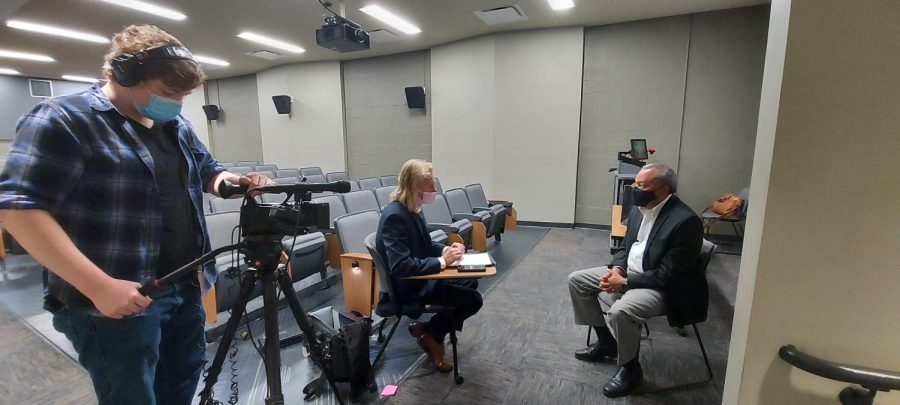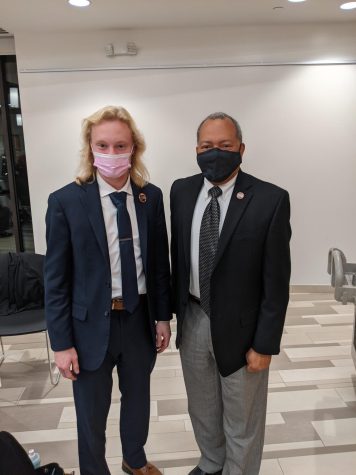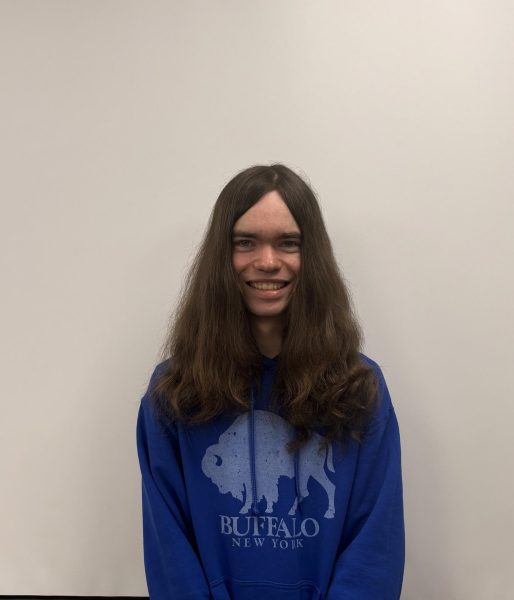Q&A With the Senior VP of Communications of the NCAA, Bob Williams
November 24, 2021
Buffalo, NY— Bob Williams paid a visit to his alma mater on Friday, November 17 to share some career advice with current students.
Williams, who has been the senior vice president of communications at the NCAA since 2010, took time out of his busy schedule to impart valuable wisdom on the Buffalo State student body during his 1 p.m. talk in Upton Hall.
Following his talk, Williams received a tour of the much-changed campus, including the newly renovated academic commons in the E.H. Butler Library. Later in the evening, Williams was inducted into the Communications Hall of Fame.
Williams was overcome with emotion due to him “never expecting such a great honor”.
However, it was I who received the true honor of the day. Ensuing his 1 p.m. talk, Williams sat down with me and agreed to a 15-minute interview. Listed below is a list of the questions I asked, with Williams’ respective answers following.
Q: Going back to where it all started, what did you major in at Buffalo State?
A: I think my major was mass communications and public relations. That was the name of the major back then.
Q: Did you intern anywhere during your college years?
A: Yes, I interned with the air force. I had summer appointments, from May through August, and I worked at the local air force base near my hometown of Rome, New York. In my last two years, I worked at the public affairs office at the air force base. That gave me a real taste of communication opportunities.
Q: What were some skills that you learned from college that transferred over to your career in communications?
A: Some of them were very basic skills. I came to college as a 17-year-old boy and left as a 21-year-old man. At its very core, I learned responsibility, I learned that I had to get and show up, I learned I had to produce. Nobody was going to do it for me. Nobody was going to make me get up. It was on me. This was one of the best lessons I learned. College gives you autonomy for the first time. If you want to succeed, you cannot be afraid of hard work.
Q: Following college, what did your career path consist of?
A: Following college, I was hired on the air force base as a writer. I spent about 6-8 months developing content for the base’s paper. Then, In November of 1979, I left for officer training school. I spent the next three months in San Antonio, Texas. In February, I was commissioned as a second lieutenant and started my career in the air force.
Q: Was your public affairs job in the air force different from what you do now in sports communications?
A: Well, the mission is obviously very different. The challenges and the problems that need to be solved are actually very similar. I spend a lot of time right now in communication strategy and developing communication strategies, and that is very similar to what I did in the air force.
Q: In your current role as senior vice president of communications for the NCAA, what does your day-to-day schedule consist of?
A: I like to think it’s always different. There are always different challenges, no matter what. I could wake up and have a task I want to address, but by 9 o’clock, something else could have happened in the sports world that diverts me somewhere else. I spend most of my time with the senior staff and president of the NCAA. We spend a great deal of time and focus analyzing what is going on in college sports, what the challenges are and developing our position on certain things and our response to certain things.
Q: When a crisis arises, is there a strict crisis-management plan you follow?
A: At this point in my career, it’s kind of muscle memory. However, whenever a crisis arises, there are always certain things that you must do. You always have to get somebody to work and sort out what is fact and what is fiction. Then I take that information and brief it to the senior staff. I offer ideas of resolution. Whenever it is time to address the media, you must always provide a course of action or plan of resolution. Otherwise, it will create more problems and questions.
Q: What is your favorite part of your job?
A: My favorite part of my job is what I’m doing right now. Going out to college campuses, meeting students, learning where they may need help, and how we might be able to assist them. That is by far the coolest part of my job.
Q: What is the most challenging part of your job?
A: I would say crisis management. The NCAA tends to be in the news a lot. Sometimes we make the news, and sometimes the news can be made for us. In the latter case, it can sometimes be challenging.
Q: Could you elaborate on the importance of making connections in this field?
A: Knowing people and building a relationship with people is paramount. Rarely does the perfect job come along where you are hired right away. As you move up the chain, that happens less and less. What happens more times than not is word of mouth. Someone will know some organization or company that needs a vice president of communications [or another position] and they start working their network. This is when they will give you a call and offer to vouch for you. Quite often, this is the way that people get hired.
Q: Does your job, or any job in communications, have a strict list of duties that you follow, or do you have to adapt constantly to meet the needs of the company?
A: [In referring to only following a list of duties] No. Absolutely not. The list of duties is a suggestion. It is a minimum that an employer is looking for. In my experience, you have to always do more than that. Usually, when looking at a list of duties, the last line will say, “and other any duty as seen fit by the employer.” Oftentimes, those duties are the most challenging.
Q: Could you talk about the NCAA post-graduate communication internships?
A: We have three or four positions available every year. One intern works in internal and external affairs. In this position, they are primarily doing media relations and public relations. We will usually have another intern that is assigned to social media. The final one is assigned to digital and visual media.
Q: What looks great on a resume for someone trying to get a job in communications?
A: Develop a track record. Develop a record that says you are able to produce. This will make you get noticed.
Q: What made you choose a career in communications?
A: I have always been intrigued with television and television news. I thought about all the different careers out there, but I kept being drawn to communications. However, I was never totally sure what I wanted to do. One semester I wanted to be a cameraman. The next semester I wanted to be an audio engineer. Then I wanted to be a journalist and work in PR [Public Relations]. I never knew exactly what it was, but Buffalo State helped me hone in on exactly what it was I wanted to do with my life.
Q: Obviously, in your position, you cannot be biased towards any particular school. However, is there any one sports team that you always rooted for behind the scenes?
A: I can’t say.
Apart from his years of professional experience, Williams shared stories of his time as a student at Buffalo State. He showed great gratitude towards the school for all it had done for him.
During his talk, Williams shared many “one-liners” that I would like to share with you. They didn’t fit into any one question or answer, but can instead be applied to life in general.
“Make sure you control technology and not the other way around.”
“An ounce of pull beats a ton of push.”
“Trust your gut. If you think something won’t turn out well, it probably won’t.
Williams truly embodies the excellence that is “Buffalo State.” Despite many hardships and personal challenges, Williams rose above his colleagues and claimed his rightful spot on the throne of communications.
By just simply doing what he does, Williams serves as a role model and a spotlight for the Buffalo State student body.
He provides us with hope, determination and a fighting spirit.
On behalf of myself and the entire student body of Buffalo State- thank you, Mr. Williams.





